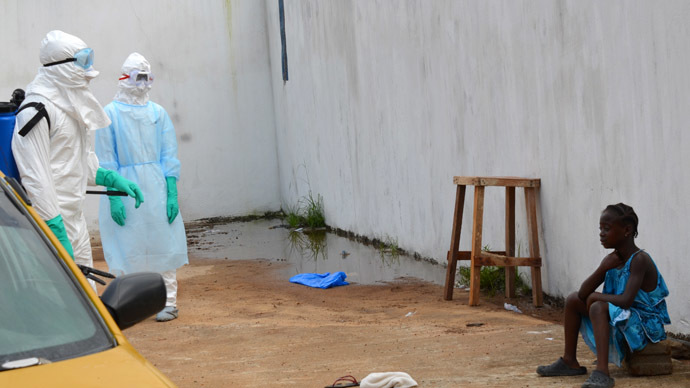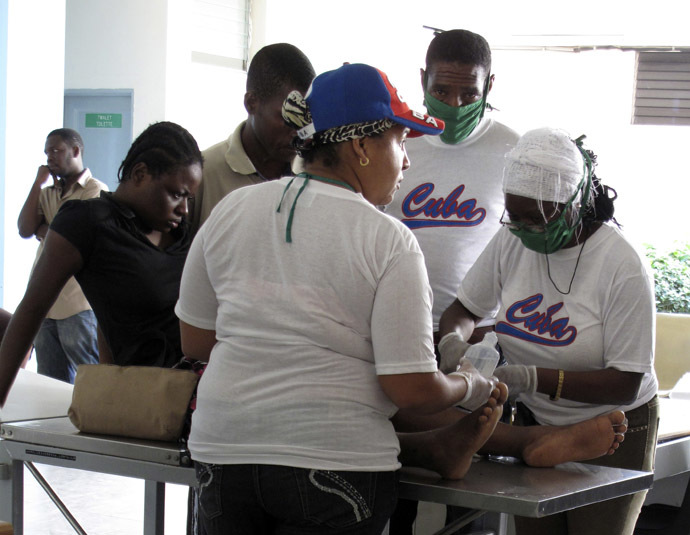Ebola crisis response: Cuba sends doctors, US deploys troops

The tiny island nation of Cuba has shamed the world with its international medical missions; the ongoing Ebola crisis in West Africa a case in point.
Something that has long gone unreported in the West, for both geopolitical and ideological reasons, is the remarkable role Cuban doctors and medical personnel are played in dealing with the aftermath of disasters and crises, both natural and manmade, throughout the developing world.
The most recent example is Cuba’s response to the spread of Ebola in West Africa. According to the World Health Organization, Cuba is in the process of sending hundreds of doctors, nurses and other medical personnel to West Africa to work on the frontline against the disease. Meanwhile, by way of comparison, the response of the United States to the Ebola crisis in West Africa has been the deployment of 3,000 troops.
Cuba’s exemplary gesture of solidarity, with a population of just over 11 million people and a GDP of around £70 billion, is made even more remarkable by the fact it currently has some 50,000 medical personnel serving on such medical missions around the world, specifically in 66 countries in the developing world.
Just one example of the invaluable role they play came in the aftermath of the Haitian earthquake of 2010. When the earthquake struck, Cuba already had 350 medical personnel working on the island, part of a solidarity mission that was established in 1998. The doctors, nurses, and support staff immediately went into action, helping to deal with one of the world’s worst humanitarian disasters in modern history.
Moreover, amid the fanfare surrounding the aid offered and transported by the US, UK, and other Western countries, Cuba dispatched hundreds more medical personnel to the stricken country. Not only that, instead of departing after just two or three months, when the news agenda had long since moved on, the Cubans remained and still do to this day.
Professor John Kirk of Dalhousie University in Canada, who has done research on Cuba's international medical teams, said at the time: “Cuba's contribution in Haiti is like the world's greatest secret. They are barely mentioned, even though they are doing much of the heavy lifting.”
You might think that such a towering record of international aid and solidarity would at least be acknowledged by Western governments. After all, aren’t they always lecturing the world on the need to help the poor; on the need to alleviate poverty and the abundant preventable diseases that flow from poverty?

In truth, the West lectures the world on global poverty, disease, and the plight of the developing world while exploiting the aforementioned in the name of profit. The role of institutions like the IMF and World Bank in being responsible for keeping the developing world in a state of underdevelopment is a shameful one, described by Nelson Mandela as a process in which “the rich and powerful enrich and empower themselves at the cost of the poorer and weaker.”
The Cuban Revolution in 1959 was in direct response to the process of super-exploitation described by Mandela. Its efficacy in resisting the onslaught of global capitalism and its predatory impact on poor countries of the developing world is reflected in the fierce and continuing attempt by the United States to starve and embargo it out of existence. Here we see the threat that a good example poses to the most powerful nation on earth. For it is not anything bad that Cuba has done or is doing that has made Washington its mortal enemy, but rather the good it has done and is doing, with its international medical missions constituting irrefutable evidence in this regard.
To really understand what drives Cuba to place such importance on this aspect of its foreign policy, the answer is contained within the country’s constitution. In it Cuba declares that it bases its international relations on the principles of equality of rights, free determination of peoples, territorial integrity, independence of States, international cooperation for mutual and equitable benefit and interest.
The emphasis Cuba places on medicine has also allowed it to achieve remarkable health outcomes at home; achievements made even more remarkable when we factor in the obstacles it has faced since the revolution as a result of the US embargo, making it harder to obtain equipment and certain drugs. For example, according to the Organization for Economic Cooperation and Development (OECD), when it comes to infant mortality, Cuba’s 4.8 deaths per 1,000 live births are comparable with the UK and lower than the US. This is despite Cuba spending a mere $400 per person per year on health, while the UK spends $3,000 and the US spends $7,500. The difference is of course in the way the money is spent and how it is distributed across the entire population. Healthcare in the US is a privilege of wealth rather than a human right. In other words, the poorer you are the lower your health outcomes will be in the land of the free.
Medical training in Cuba lasts six years, which is a year longer than in the UK, and every graduate is mandated to spend a minimum of three years working as a family doctor in the community, looking after between 150-200 families along with a nurse out of a local clinic. The country also takes pride in training thousands of doctors from overseas in its internationally renowned Elam medical school in Havana, where an emphasis is placed on inculcating a sense of obligation in those international students to serve the poor in their native countries when they return.
The difference between a nation whose first response to a natural or humanitarian disaster is to send doctors and nurses, and a nation whose first response is to send troops is the difference between civilization and barbarism. Cuba shames those nations who preach the former while practicing the latter.
The statements, views and opinions expressed in this column are solely those of the author and do not necessarily represent those of RT.
The statements, views and opinions expressed in this column are solely those of the author and do not necessarily represent those of RT.













